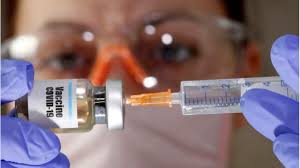NE NEWS SERVICE
NEW DELHI, MAY 11
The Centre appealed to states on Tuesday to prioritise vaccinating those due for second dose of COVID-19 vaccine and reserve at least 70 percent of the shots supplied from the central pool for the purpose.
States have also been urged to minimise wastage of vaccine doses, the health ministry said in a statement.
All wastage more than the national average hereafter is to be adjusted from the subsequent allocations to that state or union territory.
The urgent need to address a large number of beneficiaries waiting for second dose of vaccine was stressed in a meeting held by Union Health Secretary Rajesh Bhushan and Dr R S Sharma, the Chairman of Empowered Group on Technology and Data Management to Combat COVID-19, with state officials to review the status of COVID-19 vaccination on Tuesday.
States were urged to “ensure all beneficiaries who have taken the first dose are prioritised for the second doses”, the ministry said in the statement.
In this regard, states can reserve at least 70 percent of the vaccines supplied to them from the Government of India channel for second dose vaccination and the remaining 30 per cent for first dose.
“This however is indicative. States have the liberty to enhance this to as much as 100 percent. State-wise numbers on CoWIN have been shared with states for their planning purposes.
“The states were asked to undertake awareness campaign for reinforcing the importance of complete vaccination with two doses of the vaccine,” the statement said.
Presenting details of states who have ensured high coverage of priority groups (like population aged 45+, frontline workers and healthcare workers) and the others, the Union Health secretary urged states to ensure that priority groups are vaccinated.
States have been informed in a transparent manner in advance about the COVID vaccines being provided to them from Govt of India channel. The visibility for the forthcoming fortnight is conveyed to them in advance to enable better and more effective planning by them, the statement stated.
The next allocation for the period 15-31th May will be conveyed to them on May 14. It was pointed out that states can utilize the information regarding dose allocation for the next 15 days to plan their vaccination sessions.
States were also urged to minimise vaccine wastage, the statement said. While the overall levels have considerably reduced, Union Health Secretary pointed that there were many states which still needed to substantially reduce the wastage.
It was suggested to states and UTs to retrain and reorient vaccinators to ensure judicious usage of the vaccines.
“All wastage more than the national average hereafter is to be adjusted from the subsequent allocations to that state and UT,” the statement said.
In this context, it was also pointed out that certain states are able to report a negative wastage because the well-trained health workers can extract maximum doses per vial than what is otherwise generally earmarked.
States were also briefed about procurement from the ”Other than Government of India” (OGoI) channel which has been opened in the Liberalised Phase-III Strategy of Vaccination.
In view of the payments pending from states to the private vaccine manufacturers, the states were advised to constitute a dedicated team at state level of 2 or 3 senior officers to coordinate with vaccine manufacturers on a daily basis and secure State Govt. supplies promptly, the statement said.
This team is to also coordinate with private hospitals to facilitate their procurement thereby maintaining the momentum of the overall vaccination exercise in the State.
The CoWIN platform is also being modified to better reflect the changing needs of the vaccination exercise, the statement said.
The states can download a second dose due report to better plan the completion of vaccination of the target groups., the statement said.
The District Immunization Officer and COVID Vaccination Centre Manager can increase the session capacity according to demand and can also visualise the target group in their upcoming sessions. Beneficiaries without relevant photo ID cards like senior citizens at old-age homes, etc., can also be registered, the ministry said.









